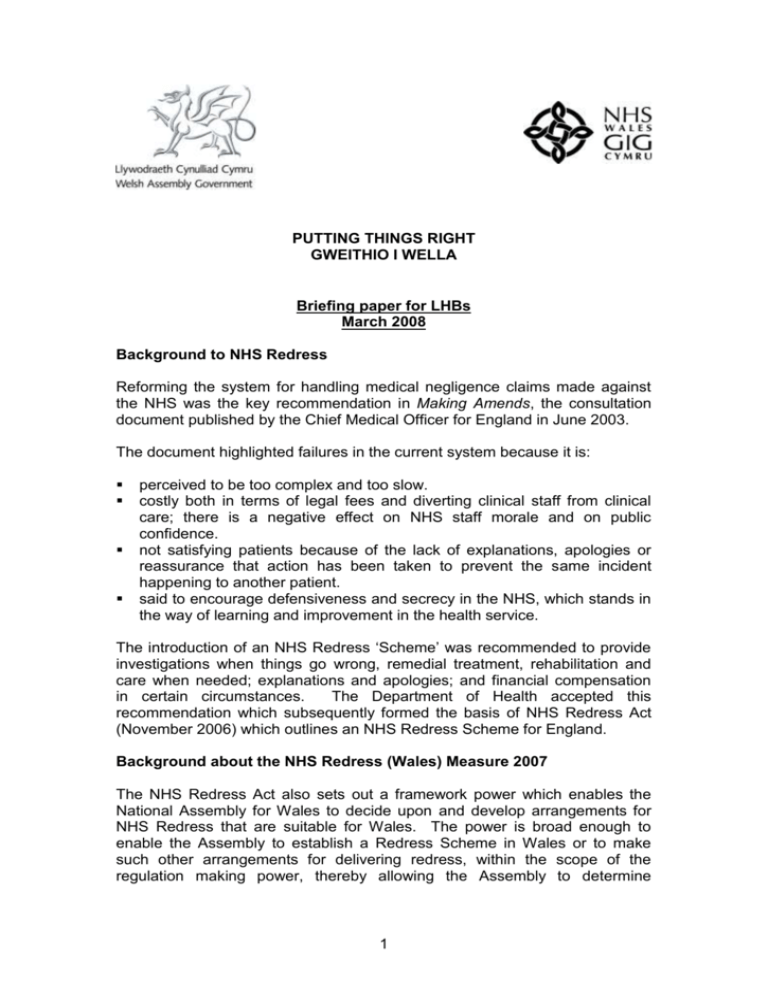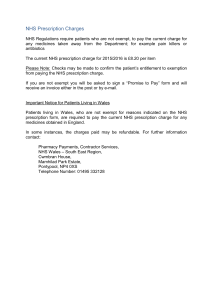Briefing paper for LHBs
advertisement

PUTTING THINGS RIGHT GWEITHIO I WELLA Briefing paper for LHBs March 2008 Background to NHS Redress Reforming the system for handling medical negligence claims made against the NHS was the key recommendation in Making Amends, the consultation document published by the Chief Medical Officer for England in June 2003. The document highlighted failures in the current system because it is: perceived to be too complex and too slow. costly both in terms of legal fees and diverting clinical staff from clinical care; there is a negative effect on NHS staff morale and on public confidence. not satisfying patients because of the lack of explanations, apologies or reassurance that action has been taken to prevent the same incident happening to another patient. said to encourage defensiveness and secrecy in the NHS, which stands in the way of learning and improvement in the health service. The introduction of an NHS Redress ‘Scheme’ was recommended to provide investigations when things go wrong, remedial treatment, rehabilitation and care when needed; explanations and apologies; and financial compensation in certain circumstances. The Department of Health accepted this recommendation which subsequently formed the basis of NHS Redress Act (November 2006) which outlines an NHS Redress Scheme for England. Background about the NHS Redress (Wales) Measure 2007 The NHS Redress Act also sets out a framework power which enables the National Assembly for Wales to decide upon and develop arrangements for NHS Redress that are suitable for Wales. The power is broad enough to enable the Assembly to establish a Redress Scheme in Wales or to make such other arrangements for delivering redress, within the scope of the regulation making power, thereby allowing the Assembly to determine 1 arrangements for redress which are most relevant to its policies and plans for the health service in Wales. Background about the Putting Things Right Project In order to ensure that this new legislative power is used to best advantage, the Welsh Assembly has set up a project – Putting Things Right – to look at the scope for developing and implementing an integrated and workable process that delivers effective and fair redress when things go wrong for patients who are eligible for NHS care in Trusts in Wales, by 2009. The underlying principle of Putting Things Right is that whenever concerns are raised about treatment and care, whether that is through a complaint, claim or patient safety incident, those involved can expect to be dealt with openly and honestly; receive a thorough and appropriate investigation; a prompt acknowledgement and detailed response and clarity about next steps, and an appropriate option for resolution. This is in line with priorities already set out in: The Healthcare Quality Improvement Plan (November 2006) which makes a commitment to developing integrated arrangements for dealing with things that go wrong including appropriate redress (Action 9). The Healthcare Standards for Wales (May 2005) which sets standards for healthcare organisations to look at complaints promptly and thoroughly in accordance with complaints procedures (Standard 15) and identify and learn from all patient safety incidents and other reportable incidents (Standard 16). Putting Things Right Project work to date Earlier this year, as part of the Putting Things Right Project, NHS Trusts were asked to complete a questionnaire on how they deal with concerns now and what improvements they feel could be made. The information provided was extensive and helpful, and forms the basis for the work being undertaken by three working groups who are taking forward the work for the project board. These groups are working closely with stakeholders to look at three key areas: Investigation and process – chaired by Adam Peat, the Public Services Ombudsman for Wales Legal advice – chaired by Anne-Louise Ferguson, Welsh Health Legal services Advocacy and Assistance – chaired by Cathy O'Sullivan, Gwent Community Health Council The groups have already made interim recommendations to the Assembly, to provide background for the NHS Redress (Wales) Measure Committee's report which was published in January 2008. The report supported the general principles behind the Measure and made a number of 2 recommendations how the Measure should proceed. The working groups are due to make final recommendations to the Assembly by September 2008. The interim reports, other information about the project and links to the Measure Committee's report can be found by visiting www.wales.nhs.uk/ppi. What does this mean for Primary Care? One of the key recommendations in Measure Committee's report, having sought wide-ranging evidence on the issue of whether primary care should be included under the NHS Redress (Wales) Measure at the outset, concluded that: "Before any decision is taken to expand the redress arrangements to include primary care a full evaluation is conducted of the scheme's operation in the secondary care setting. We also recommend that the Minister should carry out a full and thorough consultation with stakeholders on any proposed expansion of the scheme to include primary healthcare and that this should take place prior to the drafting of the relevant regulations." At this stage therefore the NHS Redress (Wales) Measure and the Putting Things Right Project are concentrating on developing arrangements that will apply to secondary care. Although the focus remains on secondary care, one of the recommendations of the Investigation and Process Working Group is that the way in which NHS complaints are dealt with in primary care needs to be reviewed, as part of the process of reviewing the current NHS complaints guidance. In particular, the roles and responsibilities of Local Health Boards, as commissioners of healthcare, when dealing with complaints needs to be strengthened. This is not to say that primary care practitioners and independent contractors should not continue to investigate complaints and concerns, but that, for example, there may be occasions when it would be appropriate for Local Health Boards should become more involved. In order to start this work, a questionnaire will be sent out to all Local Health Boards in the near future to ascertain how complaints managers feel that their organisations currently deal with complaints and concerns, and what improvements they feel could be made to the current guidance and practice. Should you require any further information, please contact the Project Office: Putting Things Right Project Office Public & Patient Involvement Branch Welsh Assembly Government Cathays Park Cardiff CF10 3NQ Ann-Marie Carpanini-Lock Piera Cassettari: Tel: 02920 823 218/ e-mail: annm.carpanini@wales.gsi.gov.uk Tel: 02920 801 081/ e-mail: piera.cassettari@wales.gsi.gov.uk 3




